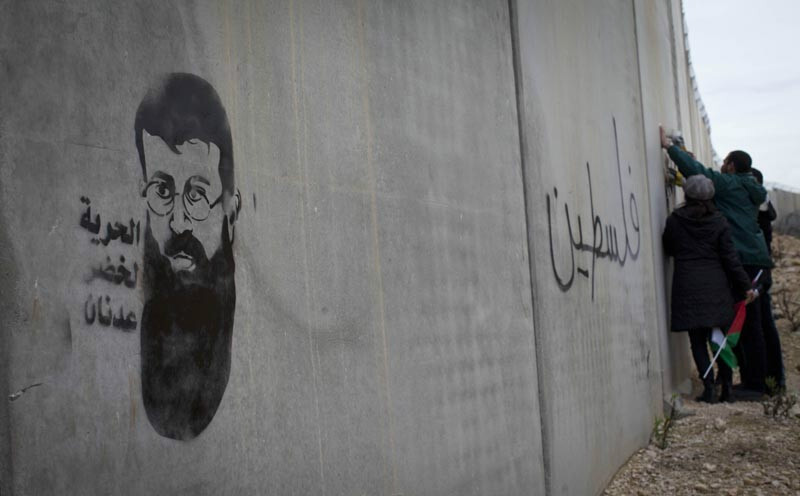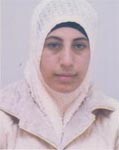Rights and Accountability 23 February 2012

Demonstrators spray graffiti with the image of Palestinian prisoner Khader Adnan, hunger striking for more than two months, during a protest to mark 7 years for the struggle against the wall in the West Bank village of Bilin, February 17, 2012.
ActiveStillsKhader Adnan, the Palestinian who ended a 66 day hunger strike against his detention by Israel without charge or trial is recovering well, but remains in a precarious medical condition, according to a joint statement from Addameer and Physicians for Human Rights - Israel (PHRI), which respectively sent a lawyer and doctor to visit him today (full text below).
Meanwhile, news has emerged that a Palestinian woman is on hunger strike against her detention without charge or trial by Israel.
Khader Adnan is now eating three meals per day, but must eat slowly and divide the meals into two portions after ending the longest hunger strike in Palestinian history.
On 21 February, Israel agreed to release him on 17 April – three weeks earlier than planned – and not to renew his administrative detention, a deal that met Adnan’s minimum conditions.
But, today’s statement cautioned:
Hospital personnel note that even if he seems as though he is recovering well, it is important to remain cautious; each day of recovery holds major risks due to the complexity of balancing all of his needs and the potential failure of his heart. He is still suffering from extremely weak muscles, preventing him from being able to walk. Khader has been given the impression that he will be moved out of the hospital and into prison too soon, a fear shared by PHR-Israel and Addameer.
Adnan, whom Israeli officials accuse of being a senior member of Islamic Jihad even though they never charged him with a crime, reportedly “expressed his utmost gratitude for his fellow prisoners and individuals all over the world who have supported him, and reminded the local and international community that the real issue at hand is not his case but rather the case of all other prisoners and Palestinians living under Occupation.”
In what Addameer and PHRI termed an “unprecedented decision that has the potential to affect other Palestinian prisoners as well,” an Israeli court today ordered the removal of shackles that have tied Adnan to his bed, even though he is too weak to walk.
Amnesty International criticized Israel’s deal with Adnan as “insufficient” and called on Israel to end its use of administrative detention.
Yesterday, the Guardian published an article by Randa Adnan, Khader’s wife in which she recalled her husband’s arrest on 17 December and the effect of his hunger strike.
“The havoc they wreaked will always remain etched on the minds of our two daughters, Ma’ali, aged four, and Baysan, one-and-a-half years old. I would not be surprised if even our unborn baby will also be affected. Such was the trauma that accompanied the Israeli raid,” she wrote.
Hana al-Shalabi on hunger strike against renewed administrative detention

Hana Yahya al-Shalabi
AddameerMeanwhile, news emerged today that a Palestinian woman, Hana Yahya al-Shalabi is on hunger strike against her renewed “administrative detention” without charge or trial by Israel. Al-Shalabi spent more than two years in administrative detention, and had been freed last October as part of the prisoner exchange deal between Israel and Hamas.
On 16 February, al-Shalabi, who is 29, was once again arrested by Israeli occupation forces from her home near Jenin in the occupied West Bank and is again under detention without charge or trial.According to an Addameer profile which refers to her earlier period of detention:
Shalabi was arrested from her family home on 14 September 2009. At approximately 1:30 a.m. that morning, Israeli soldiers in 12 military jeeps surrounded her house in Burqin village, near the West Bank town of Jenin. The soldiers ordered Hana’s entire family outside of the house and demanded Hana give them her identity card. They then proceeded to conduct a thorough search of the family’s home. During the search, one of the soldiers forcibly removed framed pictures of Hana’s brother Samer, who was killed by the Israeli army in 2005, tore them apart and walked over the pieces in front of the entire family.
Shalabi was subjected to solitary confinement, abuse and sexual harrassment during her interrogation and then ordered to be detained without charge or trial for six months.
That order was later renewed, however she was subsequently released as part of the prisoner deal in which Israel agreed to release 1,027 Palestinians in exchange for the return of an Israeli soldier who had been held in Gaza since 2006.
Text of Addameer and Phyiscians for Human Rights - Israel joint statement on Khader Adnan
Khader Adnan Begins His Slow Recovery While Israeli Court Issues a Decision to Remove His Shackles
Ramallah, 23 February 2012—Following the cessation of his 66-day hunger strike on the evening of 21 February 2012, a Physicians for Human Rights-Israel (PHR-Israel)-affiliated doctor and Addameer lawyer Samer Sam’an visited Khader Adnan today, 23 February, to closely monitor his current condition.
According to the PHR-Israel-affiliated doctor, “Khader’s condition remains unstable. He will be facing a long, continuous recovery process.” Khader is now eating three meals a day, but has been instructed to eat them slowly and in two different portions. Hospital personnel note that even if he seems as though he is recovering well, it is important to remain cautious; each day of recovery holds major risks due to the complexity of balancing all of his needs and the potential failure of his heart. He is still suffering from extremely weak muscles, preventing him from being able to walk. Khader has been given the impression that he will be moved out of the hospital and into prison too soon, a fear shared by PHR-Israel and Addameer.
Khader accounted that in the hours before the deal was negotiated with Israeli officials limiting his detention, he was threatened with being fed against his will—an action that would have immediately put his life at risk. Khader remained steadfast until he received his minimum conditions for release. He expressed his utmost gratitude for his fellow prisoners and individuals all over the world who have supported him, and reminded the local and international community that the real issue at hand is not his case but rather the case of all other prisoners and Palestinians living under Occupation.
In an unprecedented decision that has the potential to affect other Palestinian prisoners as well, an Israeli District Court reached the conclusion today, 23 February, to order the removal of Khader’s shackles in the hospital bed. In the court decision, Judge Avraham Tal stated his opinion on the case filed by PHR-Israel and Addameer: “In light of the petitioner’s medical condition, shortly after a hunger strike, shackling him to the bed during all hours of the day and night, even only by one limb, is not proportional.”
Khader was shackled continuously throughout his stay at Zif Medical Center and the shackles were only removed briefly a few times. The IPS claimed that they removed his shackled during his last days of hunger strike, but PHR-Israel and Addameer do not believe this to be true. The IPS also noted that as soon as he ended his hunger strike, they decided to “reinstate” the shackling of Khader to the hospital bed. Today’s ruling allows for Khader to be shackled by only one limb when in the presence of visitors “who are not authorized by the IPS of the medical staff that treats him.” However, during today’s visits from his lawyer and the PHR-Israel-affiliated doctor, both his legs were still shackled to his bed.
PHR-Israel and Addameer reiterate their fear that he will be moved too soon out of the hospital and call for the immediate end of his detention. Despite the increased international eye on Israel regarding administrative detention during Khader’s hunger strike and the notable victory in limiting Khader’s detention period, Addameer and PHR-Israel are dismayed that no effective change has been made for the more than 300 other Palestinians held in Israeli detention without charge or trial. As of 1 February, there were 309 administrative detainees, but even in the past few weeks this number has increased.* Hana al-Shalabi, who is a female administrative detainee released in the prisoner exchange deal in October 2011, was re-arrested on 17 February 2012 and given a new six-month administrative detention order. She has been on hunger strike for the past 7 days in protest of her administrative detention.
Addameer and PHR-Israel call for an end of Israel’s practice of arbitrary detention and for all administrative detainees to be released unconditionally. Administrative detention should never be used as a collective or punitive measure. As the most severe control measure permitted under international humanitarian law, administrative detention must only be used with the strict application of all necessary safeguards. Addameer and PHR-Israel therefore urge the international community to continue applying pressure on Israel to comply immediately with its legal obligations and to bring to an end the violations of international humanitarian law currently being committed with impunity against Palestinians.
Addameer and PHR-Israel would finally like to thank all of those who supported Khader and our teams during this strenuous period and hope that international pressure is maintained until our concerns regarding Khader’s life and wellbeing are diminished.




